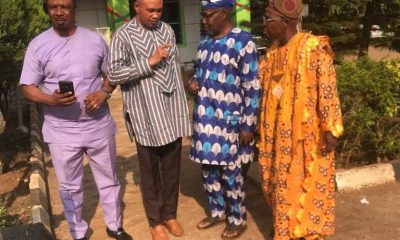News
Nigeria to spend next 40 years repaying controversial N23.72tr CBN overdrafts to FG

Nigeria to spend next 40 years repaying controversial N23.72tr CBN overdrafts to FG
The Senate, yesterday, abandoned its previous hard line stance and approved the conversion to a 40-year bond of the N23.72 trillion Federal Government’s unappropriated expenditure funded by the Central Bank of Nigeria (CBN) through its ways and means (W&M) window.
NaijaNews reports that President Muhammadu Buhari, last year, wrote the National Assembly to approve the amount alongside a fresh N1 trillion it planned to take from the window (bringing the total value earmarked for securitisation to N23.72 trillion) for conversion to a 40-year tenure bond priced at nine per cent.
The bond conversion, which would ultimately move the amount from the balance sheet of the CBN to the Debt Management Office (DMO) for management, has a three-year moratorium, the Buhari administration disclosed.
The Senate and the House of Representatives had at several times turned down approval for lack of proper explanation on how proceeds of the loans would be spent.
With the Senate’s approval, the President’s efforts to push through has now narrowed to the House of Representatives, which had rejected the plea for lack of sufficient explanation of the utilisation of the facility. Sources said the Reps might discuss the request for possible approval when they convene next week.
The lower chamber would have approved the fresh additional borrowing of N1 trillion before proceeding on election recess but held back its approval for the restructuring of the controversial N22.72 trillion, seeking further explanation on the accumulation.
When the lower chamber of the National Assembly approves the request, the amount would be moved from the CBN book where it is currently being serviced at 21 per cent interest. The Federal Government said it agreed to an interest rate payment of the going monetary policy rate (MPR) plus 300 basis points (bps) as the price of the loan. MPR is currently 18 per cent with the possibility of a further upward review.
Buhari hinted late last year that the Federal Government would spend an additional N1.8 trillion servicing the debt except it is converted to a sovereign bond priced at nine per cent. The Guardian had reported that with the current interest of 21 per cent, the government could spend as much as N4.6 trillion as the cost of yearly servicing.
If the President secures consolidated approval in the coming weeks, the current cost of the loan would come down by as much as 57 per cent. But that depends on if the nine per cent negotiated bond price subsists as the cost of commercial debt has increased in the past months.
The approval could open a floodgate of litigation over the legality of the accumulated W&M advanced ab initio. When the Buhari administration assumed office, CBN’s overdraft to the government stood at N789.7 billion. The amount has since 2015 ballooned by 2,902 per cent to its current value (N23.72 trillion).
But the controversy is more about its alleged violation of the CBN Act than the alarming growth. According to Section 38 of the CBN Act, “the Central Bank may grant temporary advances to the Federal Government in respect of temporary deficiency of budget revenue at such rate as the Bank may determine.”
But it adds: “The total amount of such advances outstanding shall not at any time exceed five per cent of the previous year’s actual revenue of the Federal Government. All advances shall be repaid as soon as possible and shall, in any event, be repayable by the end of the Federal Government financial year in which they are granted and if such advances remain unpaid at the end of the year, the power of the bank to grant such further advances in any subsequent year shall not be exercisable, unless the outstanding advances have been repaid.”
Yesterday, a renowned monetary policy expert and professor of applied economics, Godwin Owoh, said Senate’s approval amounts to illegality that would be challenged by the court by interested Nigerians.
Describing the legislative action as approval in arrears, he said the National Assembly should have focused on interrogating how the proceeds of the loans, which were not appropriated.
The administration relied on the window to cater to short-term or emergency needs and fund delayed expected cash receipts.
Adopting the report of its special committee on W&M advances, which considered the request of the President on the issue, the Senate said the restructuring was approved because the advances were made to ensure that the government did not shut down.
The Senate further approved the sum of N180.46 billion being the balance of the supplementary budget and the interest accrued on the W&M advances.
The upper legislative chamber warned that subsequently “if there is a need to exceed the five per cent threshold of the prior year’s revenue, recourse must be made to the National Assembly for approval.”
On states, whose budget shortfalls were also funded through the CBN lending window, the Senate advised: “The Federal Government should begin the process of recovering the portion of the W&M given as loans to state governments as further deferment of the repayment of the loans by the states will not be healthy for the economy.”
It also urged the government to expedite action on the repayment of the loans through treasury bills and bond issuance, saying it will not condone future accumulation without recourse to the National Assembly.
Presenting the report of the special committee, its Chairman and Senate Majority Leader, Ibrahim Abdullahi Gobir, said the committee found out that “part of the monies were given to state governments as loans to augment budgetary shortfalls in their various states”.
“Most of the requests for funds for an increase in W&M were made to Mr. President on the need to finance the budget due to revenue shortfall. Such requests were either made by the Minister of Finance, Budget and National Planning or the CBN Governor.
“The Federal Government as a result of revenue shortfalls occasioned by the COVID-19 pandemic and low oil prices relied heavily on the W&M to finance its budget deficit to keep the country working for the people. The monies received by the Federal Government were actually used for funding critical projects across the country.
“Due to the serious shortfall in Government Revenue, the Federal Government for the economy not to collapse, was compelled to borrow repeatedly from the CBN, exceeding the five per cent threshold of the prior year’s revenue as stipulated by the CBN Act,” the report stated.
The report further disclosed, “the Federal Government through the Ministry of Finance, Budget, and National Planning has concluded plans to convert the CBN loans to tradable securities such as treasury bills and bond issuance”.
Mobilising his colleagues for the rejection of the President’s request earlier, Senator George Thompson Sekibo explained that the advances were illegal and unconstitutional. He informed the Senate that the action of the President was in breach of the CBN Act and the Senate standing rules.
“We should be abreast with the information that such money was going to be taken because it was being taken on behalf of the people of Nigeria and we are entrusted with the power to make laws. They brought this without details for us to approve,” the Senator said.
But the Senate President, Ahmed Lawan, attempted severally to get the Senate to accede to the president’s request – a plea that hit the rock.
Entertainment
#CHIVIDO24: See Loved Up Photos From Davido and Chioma’s Pre-wedding Photoshoot

Naijanewsngr reports that Davido and Chioma have released their pre-wedding snapshots and videos, asserting that their wedding, which is scheduled for the 25th of June, 2024, is OFFICIAL.
Fans have tagged the wedding to be the final bus stop for a love that stood the test of time. They have asserted that the four year wait after the release of Davido’s song 1 Milli where he featured his now Fiance, has been worth it.
See pictures and Videos from the Pre-wedding photoshoot;





More wedding updates loading…
AREN’T THEY BEAUTIFUL!!
News
Dangote Refinery to set up terminal in the Caribbean for export of petroleum products

Dangote Refinery to set up terminal in the Caribbean for export of petroleum products
Dangote Refinery is planning to set up a terminal in the Caribbean to export petroleum products to countries in the North American region.
Aliko Dangote, the president and CEO of the refinery, made this disclosure on Wednesday at Afreximbank’s Trade and Investment Forum in The Bahamas.
The business mogul said the company can easily supply petroleum products to the region within 18 to 20 days.
According to Africa’s richest man, the company will sign a bilateral agreement with the region to construct the terminal for the exportation of its petroleum products.
“I know the price in the Caribbean in terms of petroleum products is very high. We produce it cheaply. We can always bring it here. We can set up a terminal and we’ll be able to fix their needs.
“We will have a bilateral agreement with them and also bringing in stuff from there is not more than 18 to 20 days maximum. And then we need to set up a terminal.
“Once we set up a terminal, they will have a very cheap oil. They will have cheap energy. And by having cheap energy, their own economy will grow faster,” Dangote said.
Dangote to also export Cement to the Region
In addition, the CEO of the $20 billion refinery mentioned that the conglomerate is not only seeking to invest in petroleum products in the region but also in cement.
Dangote stated that the company’s cement production capacity is nearly 52 million tons and will increase to about 62 million tons by the end of next year.
He added that the firm can meet the demand of the Caribbean market, creating a win-win situation for both parties.
“It’s not only about the oil. We now have a capacity of almost 52 million cement capacity. By the end of next year, we will be at 62 million of cement capacity. We are not only saying that we can bring in from Nigeria or from Africa.
“If they have limestones, we can also produce what can satisfy them. We’ve done that before in Africa and we should be able to free them up from the shackles of other people.
“If we the ingredients like the limestones etc, it’s a 28 months maximum. They can all be self-sufficient. It will be a win-win between us and them,” Dangote said.
What you should know
The Dangote refinery with a 650,000 barrel refining capacity has been described as the “game changer” of the oil and gas sector.
The refinery will be the largest in Africa and Europe once it begins full operation later next year.
According to reports, the $20 billion petroleum facility is expected to disrupt the $17 billion Africa-European market and reduce the continent’s dependence on imported petroleum products from Europe.
In addition, Dangote stated that the company is also eyeing the Brazilian market and other North American countries to supply refined products from the refinery.
“Our capacity is too big for Nigeria. It will be able to supply West Africa, Central Africa and also Southern Africa,” Dangote said in a panel discussion in Rwanda a few weeks ago.
News
Dangote Refinery Mulls Lagos, London Stock Exchange Listings

Dangote Refinery Mulls Lagos, London Stock Exchange Listings
The Dangote refinery is aiming for a dual listing on the London and Lagos bourses, a senior executive at the firm, Devakumar Edwin, has told Reuters.
Africa’s richest man and Chairman of the group, Aliko Dangote was earlier on Tuesday, quoted as saying he could try to list the company in Nigeria by the end of the year.
It is coming about six months after Dangote, also told the Financial Times of his intentions to publicly list the subsidiary of the Group, Dangote Petroleum Refinery on the Nigerian Exchange Limited.
At the time, Dangote stated that the company had resolved challenges about crude oil supply and was prepared for the listing.
The billionaire businessman already has some companies listed on the NGX, including Dangote Cement, Dangote Sugar Refinery and Nascon Allied Industries.
The refinery managers said there was need to approach the London Exchange because the Nigerian bourse may not have the capacity to handle it exclusively.
Asked to comment on Dangote’s statement to local media, Edwin told Reuters: “We have listed all our businesses. The NSE (Nigerian Stock Exchange) will not have adequate depth to handle exclusively the petroleum refinery. We would have to take it to LSE (London Stock Exchange) but also list in NSE.”
The refinery, Africa’s largest, built on a peninsula on the outskirts of the commercial capital Lagos at a cost of $20 billion, was completed after several years of delay.
It can refine up to 650,000 barrels per day (bpd) and will be the largest in Africa and Europe when it reaches full capacity this year or next.
Dangote has been trying to secure crude supplies for his refinery. He has interests in Dangote Cement, Dangote Flour Mills and Dangote Sugar, all listed on the Nigerian bourse.
In May, the company reached its first supply deal with TotalEnergies, after it put out a tender for 2 million barrels of West Texas Intermediate (WTI) Midland crude every month for a year starting in July, according to tender documents.
The company since earlier in the year, has been refining diesel, jet fuel and other petroleum products and is expected to begin the production of petrol in June.
Meanwhile, the Nigerian National Petroleum Company Limited (NNPC) has said it recorded 310 cases of crude oil theft in the past week.
In its weekly update on the activities of the national oil company, the NNPC said that the cases were discovered between May 18 and May 24.
“Between May 18 and 24, 310 cases were recorded across the Niger Delta region by several incidence sources,” the NNPC stated.
In Grey Creek, Akwa Ibom state, it said a fuel station selling illegally refined fuels into cans and drums was uncovered in the past week, revealing that 122 illegal refineries were also uncovered in Bayelsa and Rivers states
According to the company, they were spotted in Tombia II, III, IV, and Umuajuloke, in Rivers state; Iduwini, Biogbolo, and Ajatiton, in Bayelsa state, while 65 illegal connections were discovered across several locations in Akuwa Odoka, Umuajuloke, and Watson Point, also in Rivers state as well as along Soku Sand Barth pipeline in the state.
It added that vandalised wellheads were discovered in Tombia IIII in Rivers state and Egbema in Imo state, where a pit filled with crude oil from a vandalised wellhead was discovered.
In Ndoni, Rivers state, NNPC said it uncovered a vandalised pipeline channelled to a nearby oil pit, while five illegal storage sites were spotted in sacks, pits, cans, and in a fuel station.
The NNPC stated that 20 vehicle arrests were made in Delta and Imo states while 48 infractions were reported at sea. Also, 39 wooden boats conveying stolen crude or illegally refined products were seized and confiscated across several creeks in Bayelsa and Delta states, it said.
NNPC said 48 of the incidents occurred in the deep blue water, 40 in the western region, 134 in the central region, and 88 in the eastern region.
-

 News2 years ago
News2 years agoWhat Led Us To Choose Peter Obi As Our Candidate?-Middlebelt Forum
-

 BREAKING NEWS10 months ago
BREAKING NEWS10 months agoKey Insights for the Upcoming 2023/2024 UEFA Champions League Campaign
-

 Entertainment9 months ago
Entertainment9 months agoTaylor Swift Skips Travis Kelce’s Big Game to Prepare for ‘Eras Tour’
-

 News6 months ago
News6 months agoPaul Agbonze Obazele Addresses Labor Party Leaders in Edo Central Senatorial District
-

 BREAKING NEWS11 months ago
BREAKING NEWS11 months agoVan Gaal Alleges 2022 World Cup Rigged in Favor of Messi and Argentina
-

 News1 year ago
News1 year ago“New King of Serie A,” Tinubu hails Osimhen on winning the Serie A Title
-

 BREAKING NEWS12 months ago
BREAKING NEWS12 months agoBayern Munich Engages in Discussions for the Acquisition of David De Gea from Manchester United
-

 News2 years ago
News2 years agoHappy 62nd Anniversary of Nigeria’s Independence!









